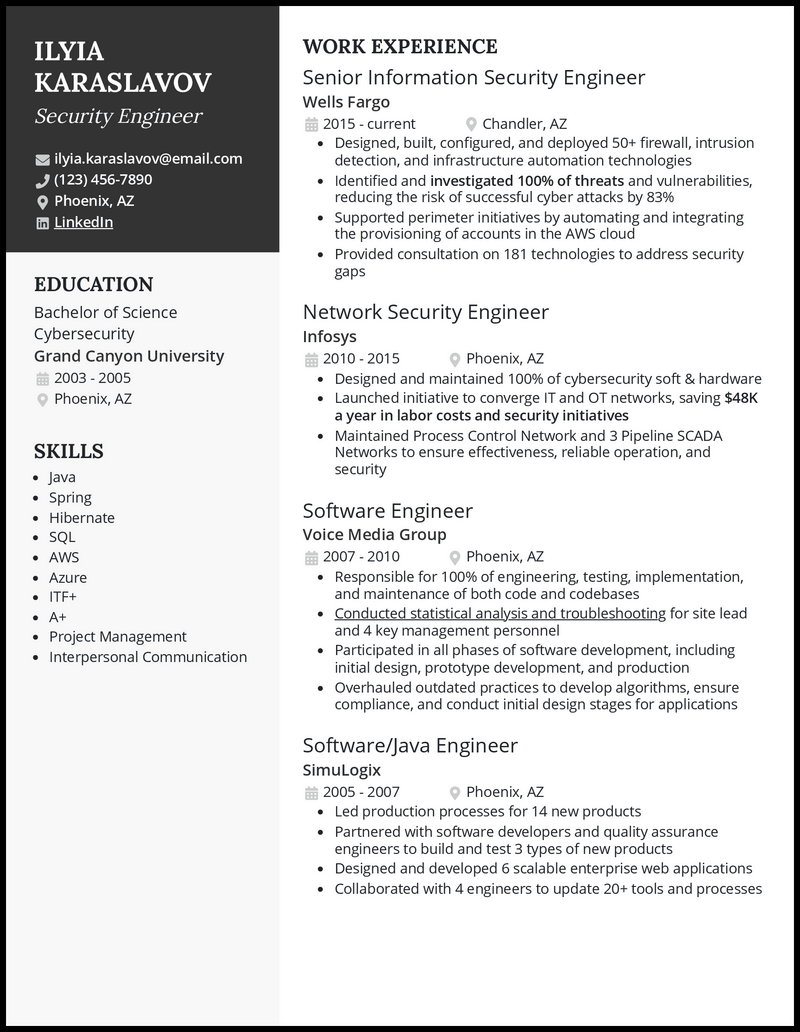As a security engineer, you hope to go unnoticed by customers and (most) of your team alike. You want your resume template to showcase why you’re so effective at flying under the radar.
Your security engineer resume and cover letter writing need to demonstrate your deep understanding of vulnerabilities in a tech stack while also highlighting your programming abilities. How do you do all of this?
These three security engineer resume templates will walk you through how to do exactly that so they’re a great place for you to get started.
Why this resume works
- Since you’re practically a guardian of networks, protecting them from external breaches, make your security engineer resume shine with quantified bullet points.
- Skip the fluff and include more impactful bullet points like “reduced the risk of cyberattacks by 83%” and “Configured and deployed 50+ firewalls” to show that you’re the IT guy every company needs to keep their systems guarded as heavily as Area 51.
What Matters: Your Skills & Experience
The first thing a recruiter will want to know when looking at your security engineer resume is if you know how to program. And if you do, what languages you’re an expert in.
Then, they’ll want to make sure you have experience with the requisite security protocols, penetration testing, etc.
As a result, the first section the rectruiter will jump to is your skills section. Here they are looking for reasons to say “no” to you. It’s key you add relevant skills mentioned in the job description.
9 Biggest Security Engineer Skills
- Python
- Assembly
- Java
- Penetration testing
- Security auditing
- SQL
- Networking
- Linux
- Git
Sample Security Engineer Work Experience Bullet Points
A lot of trust is placed in you. Of course, the best security teams have redundancies and checks in place, but you’re still the first and last line of defense for a company’s data.
As such, you need to showcase why you should be trusted based on your past experiences in security engineering. The best way to do that? Numbers.
Show the scale of what you’ve done. When it comes to your security engineer resume, numbers speak much louder than words.
Instead of focusing on your responsibilities, focus on the impact of the projects you’ve worked on. Here are a few examples:
- Implemented regular penetration testing for new features launched, increasing detection of vulnerabilities by 17%
- Built automated security testing in Java so that new code can’t be pushed to production unless it passes security checks, saving over 700 manual hours each month of QA
- Led the investigation into exposure from a vendor data breach and implemented resolution to protect user data within 48 hours
- Created real-time monitoring and reporting of suspicious network activity in C++, reducing time to first response by 76%
Top 5 Tips For Your Security Engineer Resume
- Be specific in your experience
- The phrase “security engineer” means a lot of different things at a lot of different companies. Your work experience bullet points need to be specific. Did you work on network security? Focus on penetration testing? What were your areas of focus?
- Be a master of a few trades
- I don’t know why, but developers tend to love to throw every programming language they’ve ever seen on their resume. Bad idea. It’s much better to be an expert in your domain than a jack of all trades, especially when it comes to security!
- It’s all about the impact
- What lends more credibility: saying, “I run fast” or “I run a four-minute mile”? Numbers add relevant specificity and context to your work. It also demonstrates you focus on measurable, proven outcomes. This is exactly what recruiters are looking for.
- Documentation matters
- If you’ve ever been responsible for documentation of protocols, processes, or code then that needs to be mentioned on your resume. Documentation and historical record is everything in security so remove that area of doubt from a would-be employer.
- Customize your resume for each job
- It’s admittedly more work, but you won’t get a better return on 15 minutes of work anywhere else in the job application process. Just add any relevant technical skills or projects that come to mind as you read the job description. It’s that simple.
Frequently Asked Questions
- How do I format my security engineer resume?
- Just make sure your resume is easy to read. Use a large font, don’t put too much text, and have lots of white space. Make the life of the recruiter as easy as possible with different sections and you’re more likely to get an interview.
- What do I put on my cover letter?
- Your cover letter is your chance to give more context to the 1-2 projects you’ve worked on that are most relevant to the role you’re applying to. While your resume was the highlight, this is the place to document the whole play.
- Do I need a career summary?
- No. Unless your career summary or objective is going to have new information not otherwise contained in your resume, just skip it.








